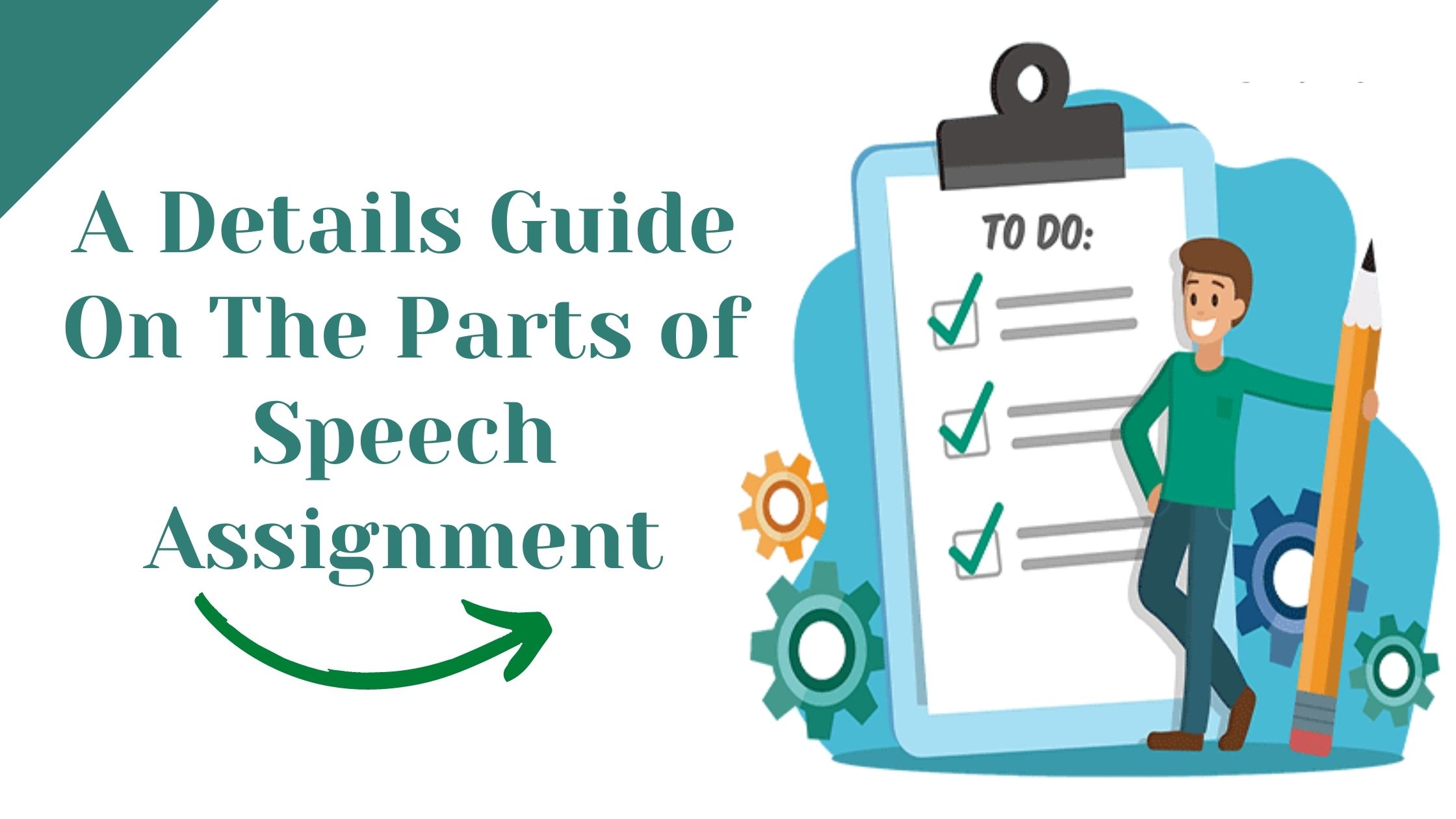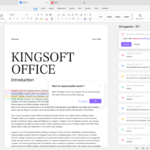A Details Guide On The Parts of Speech Assignment
- 1 The Top Eight Parts of Speech Assignment
- 1.1 Noun: –
- 1.2 Pronoun: –
- 1.3 Verb: –
- 1.4 Adjective: –
- 1.5 Adverb: –
- 1.6 Preposition: –
- 1.7 Conjunction: –
- 1.8 Interjection: –
- 1.8.1 The Bottom Line
Whether you’re an international spy on a new mission or a high school kid with math homework, you should always complete your assignments. An assignment is a task that someone in authority has given you.
The term assignment is just the noun form of the frequent verb assign, used to assign a task or a job to someone. When you give someone a task, the task is referred to as an assignment. The term may also be used to describe the act of disseminating something. “Assignment of the new chairs will begin tomorrow,” you may remark if you’re distributing new office furniture at work.
Best assignment writing services consider that the components of speech are significant because they demonstrate how words are related to one another. As you can see, knowing what a word’s role in a sentence is (what part of speech it belongs to) helps with comprehension.
The Top Eight Parts of Speech Assignment
| Speech Assignment Parts | Importance |
|---|---|
| Noun | First and most important Part of Speech Assignment |
| Pronoun | Second and most useful Part of Speech Assignment |
| Verb | Third and most crucial Part of Speech Assignment |
| Adjective | Fourth Part of Speech Assignment |
| Adverb | Fifth Part of Speech Assignment |
| Preposition | Sixth Part of Speech Assignment |
| Conjunction | seventh Part of Speech Assignment |
| Interjection | Eighth Part of Speech Assignment |
The Speech’s Eight Parts The eight components of speech are noun, pronoun, verb, adjective, adverb, preposition, conjunction, and interjection, as we all know. The part of speech identifies how a word acts grammatically and in terms of meaning inside a phrase.
When employed in different contexts, a single word can serve as more than one element of speech. Understanding the topic of parts of speech is important for getting the accurate definition of a word when using a dictionary.
Noun: –
A noun is a term that refers to a specific person, place, thing, or concept. Articles (the, a, and an) frequently come with nouns, but not every time, and are the most crucial part of a speech assignment. Common nouns do not begin with a capital letter, but proper nouns do. Singular and multiple nouns, as well as concrete and abstract nouns, are all possible.
Possession is indicated by adding’s to nouns. Within a sentence, nouns can play a variety of functions, including subject, direct object, indirect object, subject complement, and object of a preposition.
For Example:
- I finished my study.
I = subject
- The author presented the results in Chapter 4.
in Chapter 4 = object of a preposition
- His research findings can contribute to social change.
research = modifier
- Maggie wrote the dissertation.
the dissertation = object
Pronoun: –
A pronoun is something that stands in for a noun. A pronoun is frequently used to replace a specific noun, known as its antecedent. For example, the girl is the antecedent for the pronoun she in the preceding phrase.
Personal pronouns refer to distinct people or things. In contrast, possessive pronouns imply ownership, reflexive pronouns highlight another noun or pronoun, relative pronouns introduce a subordinate sentence, and demonstrative pronouns identify, point to, or refer to nouns. A pronoun is the most important part of the speech assignment
For Example:
- Smith (2014) interviewed the applicants as they arrived.
they = applicants
Verb: –
In a phrase, the verb communicates activity or existence. A primary verb is present, as well as one or more supporting verbs. Verbs are like herbs in the dish of making an assignment and are the most used part of the speech assignment.
A verb must agree with its subject (both are singular or both are plural). To express tense, verbs take on several forms.
For Example:
- A Ph.D. degree takes a great lot of devotion.
Adjective: –
An adjective may be a word that’s wont to describe or modify a noun or pronoun. Instead, it generally responds to which one, what sort, or how many there are.
It’s important to remember that adjectives in English do not have a plural form. Both solitary and plural nouns utilize the same form of the adjective.
For Example:
- The diligent student completed her assignment early.
“Diligent” here describes everything about the student and appears before the noun student.
Adverb: –
This adds to our understanding of the verb and how the action was carried out. Adverbs describe how, where, when, and why events occur. The adverb can appear before or after the verb, or at the beginning or end of a phrase, depending on the context. Adverbs the main thing that makes the speech assignment successful.
For Example: –
- He eagerly finished the course.
Answers the how question by eagerly describing how he completed the course.
Preposition: –
The 6th part of the speech assignment is the preposition. A preposition is a word that comes before a noun or pronoun and modifies another word in the sentence.
- Till… by… with…. reading…
(till tomorrow, by the tree, with our pals, reading the book)
A preposition is a word that comes before a noun or pronoun and modifies another word in the sentence. As a result, a preposition appears in every propositional sentence. Almost always, the prepositional phrase serves as an adjective or an adverb.
For Example:
- I opted to interview instructors in the district that was the most convenient for me.
- The interviewee was situated next to the recorder.
Conjunction: –
Now comes conjunction, the 7th part of the speech assignment. It is a word that joins two phrases, sentences, or clauses together.
- And… but… or… as… a result… of…
A conjunction is a word, phrase, or sentence that unites two or more items and expresses the link between them.
And, but, or, nor, for, so, yet are all coordinating conjunctions that connect grammatically similar items. Because, although, while, since, and other subordinating conjunctions connect sentences that are not equal. There are several different sorts of conjunctions.
For Example:
- Although the results are encouraging, additional study in this area is required.
Interjection: –
A word used to communicate emotion is called an interjection and is the 8th part of the speech assignment. It’s frequently followed with an exclamation mark.
- Oh, my goodness!… Wow!… Oops!
For Example:
- The little girl swiftly fled after bringing me a lengthy letter from the instructor. Oh, my goodness!
The Bottom Line
So, here we discussed all the major eight parts of the speech assignment. Students recognize that studying the eight elements of speech aids in understanding the function of words and how they are combined to form intelligible sentences. That means all the nouns, verbs, adjectives, pronoun adverbs, conjunction, preposition, and interjection will all be presented to them.
Understanding the eight parts of speech is helpful in deciphering the meaning of each word. You may quickly spot a grammatical problem in a phrase by knowing the 8 parts of speech and determining whether there is a run-on sentence, a misused pronoun, or a verb agreement problem by studying the 8 parts of speech.

















